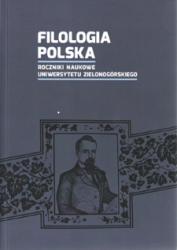The role of the press in shaping literary competence of the youngest readers in the post-partition period
Keywords
Abstract
The aim of the text is to analyse the shaping of the press youngest readers’ literary competence in the era of partitions, which was especially difficult for educational institutions. Periodicals for children at that time not only developed patriotic feeling and attitudes towards the nations and a state, which lost its sovereignty. Due to the dramatic situation of education and progressive russification and germanization, the press took an active part in education and constituted a teaching aid for popular then home schooling. The key term in the article is a literary competence, understood as a set of predispositions conditioning “a contact with the work”. Some components of this competence were closely discussed, namely: the scope of knowledge about the works and their authors passed in magazines for children; ways of developing sensitivity to the literary text necessary to receive the work, its understanding and interpretation; ways of implementing the reader to creative creations of their own text.
References
WYKAZ CYTATÓW
DD − „Dziennik dla Dzieci” 1830, t. 1, nr 1-73, [284321] [dostęp: lipiec 2016].
[Google Scholar]
PD − „Przyjaciel Dzieci. Pismo Tygodniowe”, Warszawa, 1861-1915:1861, R. 1, [164772] [dostęp: sierpień 2016].1862, R. 2, [164773] [dostęp: sierpień 2016].1863, R. 3, [164774] [dostęp: sierpień 2016].1865, R. 5, [164776] [dostęp: listopad 2016].1893, R. 44, [166224] [dostęp: styczeń 2017].
[Google Scholar]
PPL − „Przyjaciel Dzieci. Tygodnik z Rycinami, Poświęcony Nauce i Zabawie Dzieci”, Lwów 1848-1851, R. 3, [44688] [dostęp: luty 2016].
[Google Scholar]
RD − „Rozrywki dla Dzieci”, t. 1-2, Rok drugi, t. 3, Warszawa 1827.
[Google Scholar]
SZD – „Szkółka dla Dzieci. Pismo Miesięczne Poświęcone Nauce i Rozrywce dla Dzieci” 1850, t. 1, www.wbc.poznan.pl/dlibra/doccontent/39768 [dostęp: listopad 2016].
[Google Scholar]
TD − „Tygodnik dla Dzieci” 1829, t. 3, nr 29, ebuw.uw.edu.pl › e-bUW › Journals [dostęp: lipiec 2016].
[Google Scholar]
WR – „Wieczory Rodzinne. Czasopismo Tygodniowe Ilustrowane dla Dzieci”, t. 4, Warszawa 1882.
[Google Scholar]
Z – „Zorza. Dziennik Młodemu Wiekowi Poświęcony” 1843, t. 4, rcin.org.pl/libra/publicationa/19601 [dostęp: październik-listopad 2016].
[Google Scholar]
LITERATURA CYTOWANA
Cysewski K., O literaturze dla dzieci i młodzieży, Olsztyn 2001.
[Google Scholar]
Czerkies T., Rozwijanie kompetencji literackiej – teksty prozatorskie na zajęciach języka polskiego jako obcego, [w:] W poszukiwaniu nowych rozwiązań: Dydaktyka języka polskiego jako obcego u progu XXI wieku, red. W. Miodunka i A. Seretna, Kraków 2008, s. 255-263.
[Google Scholar]
Dziki S., Czy prasa dopomogła Polakom wybić się na niepodległość, „Zeszyty Prasoznawcze” 1988, R. XXIX, nr 4, s. 5-19.
[Google Scholar]
Grabowski S., Na przyszły pożytek. Z dziejów polskiej prasy dla dzieci 1824–1939, Pułtusk 2001.
[Google Scholar]
Horbowski A, Wartości wychowawcze lwowskich czasopism dla dzieci i młodzieży („Przyjaciel dla Dzieci”, „Czytelnia dla Młodzieży”, [w:] Książki, czasopisma, biblioteki Krakowa i Lwowa XIX i XX wieku, red. J. Jarowiecki, Kraków 1993, s. 165-176.
[Google Scholar]
Kaniowska-Lewańska I., Prasa dla dzieci i młodzieży, [w:] eadem, Literatura dla dzieci i młodzieży do roku 1864, Warszawa 1972, s. 121-176.
[Google Scholar]
Kuliczkowska K., Literatura dla dzieci i młodzieży w latach 1864-1918. Zarys monograficzny. Materiały, Warszawa 1981.
[Google Scholar]
Książki, czasopisma, biblioteki Krakowa i Lwowa XIX i XX wieku, red. J. Jarowiecki, Kraków 1993.
[Google Scholar]
Libera L. , „Rozrywki dla Dzieci” jako czasopismo narodowe, „Kwartalnik Historii Prasy Polskiej” 1982, 21/1, s. 5-16, [w:] bazhum.muzhp.pl/.../Kwartalnik_Historii_Prasy_Polskiej-r1982-t21-n1-s5- (czas dostępu: 23 stycznia 2016 r.).
[Google Scholar]
Markiewicz M., Literatura dla dzieci i młodzieży, [w:] Pozytywizm, Warszawa 2002, s. 338-351.
[Google Scholar]
Sławiński J., Socjologia literatury i poetyka historyczna, [w:] idem, Prace wybrane. T. 2. Dzieło - język – tradycja, Kraków 1998, s. 33-63.
[Google Scholar]
Zieliński A. R., Problematyka kompetencji czytelniczych – typologia publiczności czytającej, [w:] Książka i biblioteka w społeczeństwie, red. W. Adamiec, Warszawa – Radziejowice 1980, s. 121-144.
[Google Scholar]
Preview
Downloads
Published
How to Cite
Issue
Section
Categories
Copyright & License

This work is licensed under a Creative Commons Attribution-NonCommercial-NoDerivatives 4.0 International License.
Copyrights (a). In principle, authors who are not employed by the University of Zielona Góra retain the copyright, including publishing rights to the articles, without restrictions.
Copyrights (b). In principle, authors who are employed by the University of Zielona Góra, do not retain the copyright, including publishing rights to the articles. In such cases the copyright holder is the University of Zielona Góra.
Print ISSN
2450-3584-
Abstract108











































